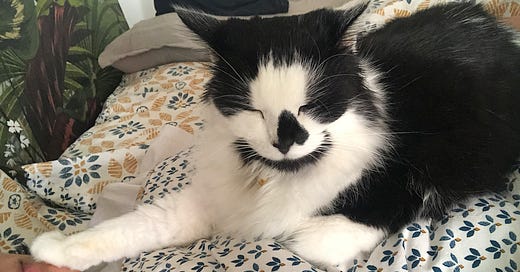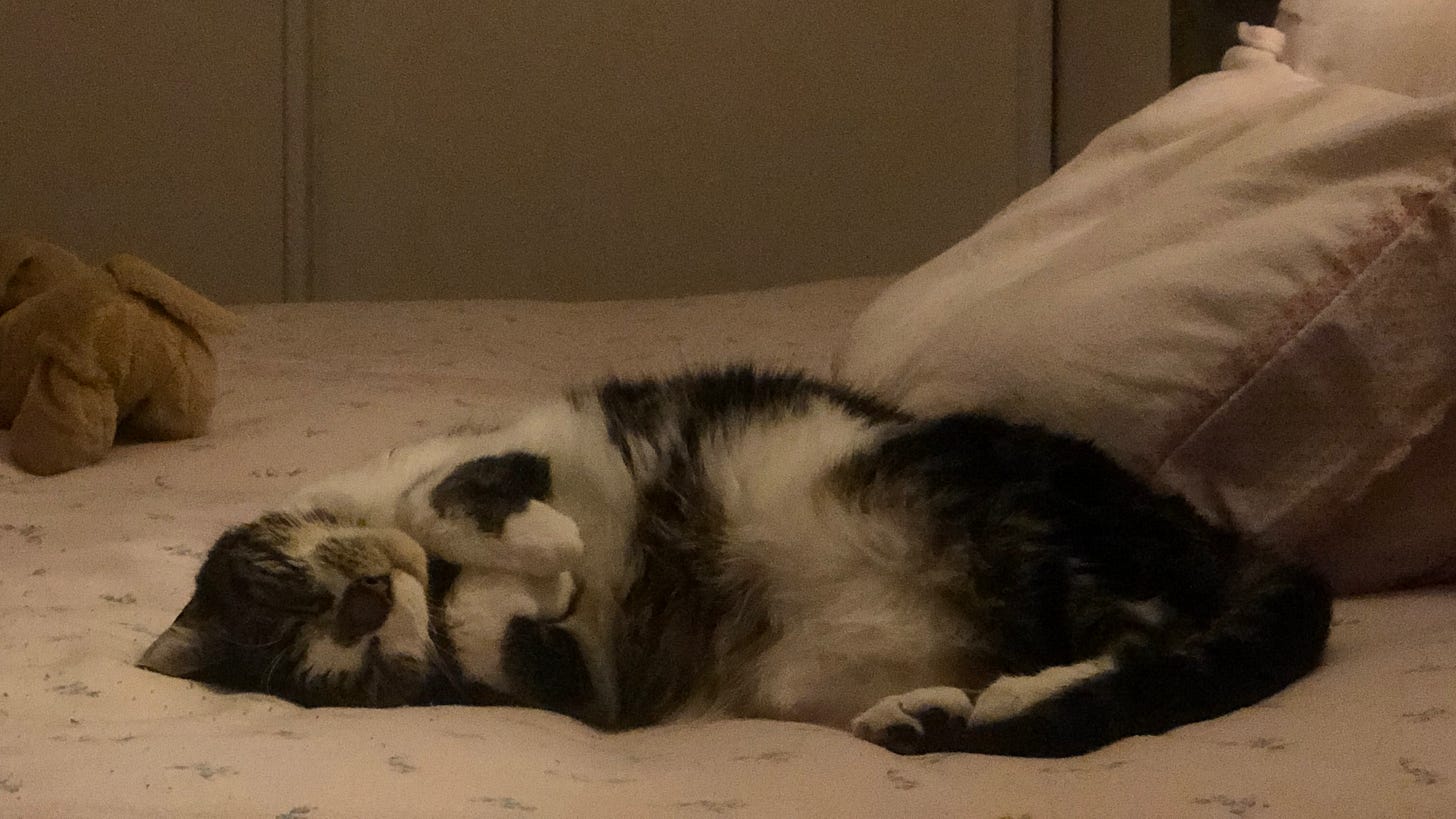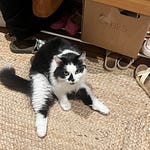Hi friends—
First of all, APOLOGIES for the audio quality. I thought my AirPods were connected, they were not, and the acoustics are awful. I was also being hassled by Mr Munch—but I’m pretty sure at least half of you are here for him, so I’m assuming you weren’t too annoyed. I would/should re-record, but I know that will set off an infinite loop of dissatisfied re-recordings and that’s a vortex I want to stay out of this Sunday morning. I am still learning—forgive me for being an audio luddite, and thank you for bearing with me. I will get better!
Anyhoo—the gist of it is, a bucolic lifestyle is not for me. Even now, as I gaze into a blue-canopied, sun-dappled olive grove and chuckle at a magpie visiting the chickens, I miss the bakery and the coffee shop. The right living situation for me is a tricky equilibrium because I like a quiet environment that’s not overstimulating, but with the option of being in a more social environment. In other words, I like the convenience of a city, with the solitude of a remote setting.
The city I’m in is… an inconvenient dichotomy. I’m too far removed from the centre, but the centre itself is dense and overstimulating. Plus, being here has reminded me that the further south we go, the more chaotic it gets; there’s more traffic, life is louder, and people don’t seem to be as bothered by overlapping lives. I don’t like to hear people living; it’s a particularly curmudgeonly idiosyncrasy of mine, but it’s what I moved out to the sticks for; isolation for insulation’s sake.
For these reasons, Berlin turns out to be an ideal city for me—it’s spacious and intolerant of infringement on personal space, while amenities are local and easily accessible. In Berlin, home is a quiet place because I can expect that my neighbours will respect this, and vice-versa; if I need anything—groceries, services, company—I only have to walk a few minutes out of my door.
Berlin is the first place that reminds me of Tokyo in this regard. It’s the first city since Tokyo where I’ve felt comfortable riding a bike, with large residential areas that feel both safe and conveniently urban. It’s never overwhelming, and it’s easy to retreat to a quiet space when I get overstimulated.
One of the first things I learned about high sensitivity, or high sensory processing, is that only a few countries in the world have cultures that are attuned to HSPs; Japan and Sweden are two of them. It explains why I didn’t realise I was differently wired until I left Japan when I was 14 (upon which I immediately began to ask myself, for the next 15 years or so, “what’s wrong with me?!”) and it doesn’t seem like a coincidence that my therapist, herself an HSP, is in Stockholm.
As an HSP, life feels like a never-ending sequence of adjusting the settings of my life to make it fit me—when I’m not trying to adjust myself to fit the world around me, that is. These days I’m trying to do more of the former, and less of the (self-minimising) latter.
There’s something I think about a lot, and that’s The Narrative. What Narrative? You know—the one that tells us Who We’re Supposed To Be. There’s one core Narrative for most of us: go to school, pass our exams, get a job, get a better job, get a promotion, make enough to support a family, meet The One, get a house, start a family, raise a family, etc. You know. The implication is that at some point, we’ll look at our lives and feel like we’ve Made It™️. We look around at other people who have Made It™️, and we aspire to make our lives look like theirs.
I don’t know about anyone else, but at no point has doing “what I’m supposed to do” ever not felt like looking around at what everyone else is doing and going, “Am I doing this right?” And you know, that’s a pretty shitty way to feel. “Fake it til you make it”? Whatever that applies to, I’m certain it does not—should not—apply to life. We’re told we’re supposed to push through what’s hard, to get to what’s worth it—but nobody really tells us the difference between what feels hard and what feels bad.
Does that sound familiar? You know when something feels really awful—in a job, in a relationship—but you go, “But I’m supposed to work hard at this, this is supposed to be hard”. ENH! I believe this is how we end up ignoring the fact that a lot of the time, pursuing our goals forces us to live in a protracted state of feeling bad, until we think this is what life feels like. But for everything that feels bad, there are also ways to feel good, right? Sure, but I wonder how much of the “feeling good when we’re not feeling bad” are simply ways that we compensate and self-medicate.
I’m sorry. And maybe I’m projecting. I’m someone who, if I’m not careful, can get really used to feeling bad. I put it down to a lifetime of not knowing how to self-validate, which, even now I’ve learned to do it, is extremely easy to forget all over again.
There was a very defining moment that this changed; less a tipping point, than a breaking point. I pushed myself so far past my edge that I burned out, leaving me so incapacitated that I couldn’t do anything at all, let alone be anything that anyone needed me to be. It felt dreadful—but also, it felt like a relief; it felt like the permission I had never given myself to do nothing, to just be, to think only of myself and what I needed in order to, very, very slowly and painfully, crawl out of this dark hole I was in and stand on my own feet again.
To think only of ourselves if we’ve spent a lifetime accommodating other people and their expectations (whether in reality or in your head) feels euphoric, even if it’s because we’re face-down on the ground and we’ve got no other choice. That’s not to say it’s easy to maintain; old habits die hard, and it wasn’t long before I got sucked back into people-pleasing and risk-aversion (because living only for yourself does involve straying off the well-trodden path, and that can feel terrifying).
It’s also scary because we might get called selfish—not by everyone, but often by people who either aren’t used to us having boundaries or don’t have boundaries of their own—and for a people-pleaser, this is one of the most mortifying prospects of all. But there’s a reassuring truth I’ve come to realise: that no matter how much I slip back into my old ways, it’s not long before I snap back into “me-first” mode.
It turns out the elastic is strong both ways; and what no one told me about burnouts is that once we have one, we never really recover—or rather, as I’ve come to realise, not “recover” so much as “go back to our old unsustainable ways of invalidating our own needs”.
Two things happen: one, our chances of a relapse are much higher and our tolerance for toxicity becomes vastly lower; two, once we’ve felt what it’s like to choose ourselves, and make decisions aligned with our core values and our best selves, we can never really go back. When our well-being becomes our baseline priority, no matter how often we stray, that’s where our elasticity becomes trained.
None of this is empirically true, necessarily; it’s my hypothesis. I can say that, for me, it’s dramatically affected the way I make decisions and how my life looks. It’s resulted in recognising that the most sustainable life choices are the ones that feel good, even if they feel scary and uncertain. Most of my life choices are leaps of faith, rather than ones rooted in best practice or a societally-approved standard.
It’s why I say “no” more often than I say “yes”, because there are still more offers that feel bad than opportunities that feel good. It’s why I’m unmarried and childless at 38, even though I want both of those things, because it never felt right until now; it’s why I decline to work with clients who don’t align with my values, even if I’m a freelancer who depends on the work I get; it’s why I spent most of my days alone, because there are so few people whose company I’d rather be in than my own.
It’s also why most days, my friends will get a text from me saying, “Girl help me, I’m back on my BS”—or they will text me saying, “Girl, you are back on your BS” (because I don’t always see it)—and provide crisis management while I navigate my way out of yet another familiar pickle. What can I say, it’s a process.
I’ve been taking myself out on a lot of dates lately. These days, my dates often end with a gorgeously romantic walk-for-one along the coastline, while I weep because beauty and also because why waste a dramatic moment? Eventually, I put myself in a cab home and call it a night well spent.
“By myself” is my favourite date of all. I’ve been dating myself for about 7 years now; I started when I was in London, towards the end of a particularly unhealthy, codependent, and toxic relationship. I’ve been breaking my pattern of unhealthy relationships into my thirties (and I believe I finally have, yay!), but my twenties were a real shitshow.
I spent most of my twenties completely faking it because truly, I had no idea who the hell I was or what the hell I was doing. I was also ignorant and self-involved, a wilful victim who wanted someone to rescue me. When I look back at the girl I was and the hell I was in, I feel sympathy—but I also know that there was only one way out for her, and that was to crash and burn a whole bunch.
Now, I like my own company now so much that if I have the option of asking someone else to join me, I would probably rather go alone. Why? Because I am almost always excellent company; I am rarely a drain on my own energy, and I usually laugh at my own jokes. (Notice I don’t say “always” or “never”; I still annoy the shit out of myself at times.)
I’ve often heard, the more single and the more thirties I am, that there’s such a thing as being too happy alone. There does come a point where you look at the contentment you’ve created for yourself—which may be inextricably linked to the solitude you’ve created for yourself—and wonder, as much you want to share this with someone else, how you can possibly share this with someone else.
I don’t often have to wonder for long because, inevitably, I find out that I can’t. I don’t know what this means—that there is a price to making ourselves happy, to not needing anyone else? Or is this some version of The Narrative that I haven’t discovered yet? I’m betting on the latter, if only because I can’t not.
Things that helped this month
An HSP community
I attended a Zoom meeting hosted by Alane Freund and Annet de Zwart, two HSP specialists, about intention-setting in the new year. It was really interesting to see dozens of HSPs gathering together in one place, and to hear what resolutions mean to us. One of the helpful things I learned is that, like me, the other HSPs tended to make resolutions throughout the year as opposed to setting them at the beginning of the year. For me, “resolutions” aren’t a seasonal event; I constantly set goals for myself, and need to keep the needle moving forward at all times. It was interesting to learn that this appears to be a trait of my hypersensitivity.
I’ve also been understanding a lot about myself by digging deeper into studies on hypersensitivity. My friend Caitlin and I are reading this book together, both of us for the second time; I’m finding it really helpful to read, share, and reflect with another person and grateful that we can be sounding boards for one another.
A reading list
Fact: With the exception of books in the “professional” genre, it’s been years since I read a book written by a cis white man. The simple reason is that, from experience, I don’t find them relatable, but I do too often find them clichéd, sexist, and colonial. I know there’s probably a lot of great literature I’m missing out on, but here’s another fact:
There’s a lot—a lot—of great literature written by people who are not cis white men.
I mostly read books written by not just women, but women of colour. This is a particularly great time for women of colour in literature—as if the literary world suddenly woke up to these narratives that have existed all along—although it’s still way behind.
The Good Reads newsletter is really great at promoting new works by women of colour (or maybe they just have a great algorithm that delivers what I want to read?), and I’m also very excited about this reading list. I’m already way behind on my own, but I’m thrilled there’s so much great literature to look forward to. Speaking of…
A Brief History of Fruit
I have to confess I’ve always had kind of a hard time reading poetry. I’m really not sure why; I’m big into nuance and interpretation, but I’d sooner read a film script than a book of poetry. But sometimes, it hits; when Caitlin sent me a couple of poems from this book, I went out (ok, I stayed in and hit “purchase”) and bought it immediately. Written from the perspective of someone whose cultural identity has been bamboozled by geography, colonization, and family dynamics, it’s really taking my breath away with its visual, sensual, and visceral exploration of racial and cultural belonging. Yum.
Not this
Nothing about this topic should surprise me anymore, but I am appalled—appalled—that this is a thing. People really wanna say this word that bad. Please stop it. As in, not just saying it yourself, but please stop other people when you hear them saying it.
Anthony Ramos
I started bingeing She’s Gotta Have It (belatedly, I know) and fell swiftly and irrevocably into an Anthony Ramos rabbit hole. I haven’t even seen him in Hamilton or In The Heights—I’m too busy weeping over his sweet voice and fanning myself over his cK ad.
A haircut?
Question mark, because TBD if it helped. At first, I hated it; what I wanted was this, and there was a very real fear that what I got was this. I never really know what haircut I ended up with until I wash and style it myself, and I guess it’s fine. I don’t love it, I don’t hate it. It’s a change, change is good.
Men with lapdogs
Why do I find the sight of a man cradling his beloved pooch on his lap so delightful? Obviously, we’re not talking Akita proportions—max spaniel-sized, I’d say. It’s giving me “outdoor cat dad”—and we know I stan a cat dad. Matter of fact, maybe it’s just giving me straight-up “daddy” vibes. Either way, I’m into it. Men, wear your tenderness openly. It’s hot.
Here’s an obvious musical segue:
An honest review
There’s a lot of film and TV that I feel like I should watch but I don’t want to watch because I don’t like feeling sad or bad. The Lost Daughter is one of them, and this very brief review by Roxane Gay in her newsletter makes me feel less guilty about it.
The Audacity
By the way, a lot of the content I share comes from Ms Gay’s excellent newsletter, The Audacity. I tend to oversubscribe to things that I never get around to reading, but her excellent and juicy Weekly Roundup is one I look forward to and never miss. The Audacity is primarily a platform for publishing underrepresented emerging writers; I love that Ms Gay is using her platform to help undiscovered talent reach a huge audience. The quality of writing and diversity of perspectives that don’t get enough mainstream airtime are so worth subscribing for.
Roxane x Tressie
I also became obsessed with Hear to Slay, the podcast Ms Gay co-hosts with Tressie McMillan Cottom. I could pass an entire day listening to these two brilliant, funny women talk about everything from antiracism and politics to couple’s therapy and celebrities. This season, Ms Gay is continuing the podcast solo and it’s rebranded as The Roxane Gay Agenda—still equally excited to listen.
COVID Standard Time
Therapy
I’ve had some big breakthroughs lately, and I’m in the process of shifting some very deep, very uncomfortable, very problematic patterns. The therapy works, you guys.
To me, people who say they don’t believe in therapy are like people who say they don’t believe in extraterrestrials.
You think you that smart?
You’re really telling me that you think we—the dumbasses out here that are destroying the only planet we got—are the most intelligent beings in the entire universe?
Excuse me, wrong rant.
I mean, you’re really telling me that you think you are smart enough to recognise, let alone unpack, all your behaviours that arose in response to things that happened to you that you’ve been carrying around as a legitimate part of your personality ever since, when in fact at least half your personality is probably a coping mechanism?
Listen…
Cats that helped this week
They have been sleeping a lot. I’ve also got them on a new food which is very stinky and they can’t get enough of it. Cats are notoriously fussy eaters, but they harass me day and night for this food—if you’re a cat parent, you’re welcome (it’s the salmon one1).
This past week I’ve been thinking a lot about my beautiful five year-old nephew, and one recent memory in particular. Over the holidays, I took him and his two year-old sister to a cat cafe; they were perfectly behaved and gentle with all of the cats. There was one kitten, in particular, we needed to take extra care around—a four-month old Sphinx cat named Sir Albert (I know, and I cannot).
This was the first time in his sweet little life my nephew had ever seen a Sphinx. As he came up to it, he gasped, looked at me with a wonder-filled smile and whispered, “Il n'a pas de poil !” (“He doesn’t have any fur!”) He continued to stroke him, and then said to me in a serious and slightly protective tone, “Il est très fragile.”
There wasn’t a hint of judgement or disgust in his voice, which is something I would expect even from a kid his age who’s used to seeing cats with fur; there was a total absence of any bias that a cat is “supposed to” have fur. He just looked like he had discovered something totally wondrous and magical. That we could all be so pure 🥲
Gonna go weep now. Have a lovely Sunday night, folks ✨
I tend not to buy any flavours that I think my cats are unlikely to catch for themselves in the wild, even though the prospect of them salmon-fishing is about as far-fetched and ridiculous as them taking down a whole cow.



















Share this post